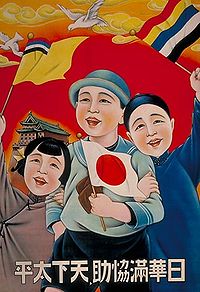Information and comments on the essay:
Japan, America, and sacred nationalism
From the book: Chum for Thought: Throwing Ideas into Dangerous Waters by David Satterlee
Find out more, including where to buy books and ebooks
Read or download this essay as a PDF file at: https://docs.google.com/file/d/0B4eNv8KtePyKZkxRVW9jSWpsZVk/edit?usp=sharing |
| Chum For Thought: Throwing Ideas into Dangerous Waters |
Japan, America, and sacred nationalism
The Japanese islands have remained relatively isolated
throughout their history. This has allowed for the development and concentration
of distinctive religious and cultural characteristics. Although Japan has
experienced Eastern influences (mostly Chinese and Buddhism), and Western
influences (especially Anglo/American and Christian), these have seemed to only
flavor, not disrupt, the Nipponese sense of identity. This bears a strong
resemblance to contemporary American right-wing conservatism.
From the most ancient times, Japan, and its Shinto practices
have been organized around community-clans and their respective clan gods. Even
when communities gradually expanded, community worship continued to revolve
around local guardian gods and the ancestors of extended families. Broader
political power was rooted in the relationships of confederations of clans.
This religio-cultural structure made it unlikely that religions of foreign
origin could have much impact and still remain intact. This system retained a
stable core of abiding traditions, supplemented by a somewhat more adaptive
layer of minor local traditions.
As an example, Buddhism, when promoted by certain nobles,
was assimilated in Japan by
considering local practices as manifestations, rather than contradictions. It helps that Buddhism does not insist on a strict distinction between secular matters and that which is sacred. Seeking purity was already esteemed as a matter for all members of Japanese society. Extending that search for purity, by renouncing the world and taking up monastic service, was no great leap. Accepting the Buddha Nature in all things is parallel to accepting the spirit essence in all things. Buddhism advocates that one abandon grasping for self-interest as Shintoism promotes community welfare over selfish pursuits.
considering local practices as manifestations, rather than contradictions. It helps that Buddhism does not insist on a strict distinction between secular matters and that which is sacred. Seeking purity was already esteemed as a matter for all members of Japanese society. Extending that search for purity, by renouncing the world and taking up monastic service, was no great leap. Accepting the Buddha Nature in all things is parallel to accepting the spirit essence in all things. Buddhism advocates that one abandon grasping for self-interest as Shintoism promotes community welfare over selfish pursuits.
In Japan, community purity and religious control was part
and parcel of political authority. The Shoguns, for instance, never hesitated
to challenge religious influences that threatened their power. Each ruling clan
elevated their own gods and divinized their own ancestors, producing “sacred
kings.”
Eventually, Japanese society was able to more-completely
organize itself into a coherent nation with supreme religious and secular
authority vested in the Emperor. When war with China was initiated in the
Emperor’s name, it became a sacred national war and reflected Japan’s
over-riding pride in their national superiority and identity. All aspects of
life became part of a holy war. At the end of World War II, American
strategists seriously considered that every citizen would take up arms if the
mainland of Japan was invaded.
Although the current Japanese culture retains a strong sense
of honor and responsibility to community, the shock of Japan’s ultimate defeat
in World War II devastated their sense of sacred nationalism. Japan is now
often considered to be even more secular that the West. Japan has been rapidly
industrialized and urbanized. Social mobility and personal isolation is
endemic. The Japanese psyche has rocked from one pole to the other.
Presently, parts of American culture are in a state of
radical transition as right-wing religious conservatives struggle for
ever-greater governmental control. We are, on the one hand, “One nation under
God,” and, on the other, a melting pot of diverse immigrants. This makes
generalizations difficult and open to contradiction. Nonetheless, George Bush
was able to start and sustain foreign conflicts in the name of “protecting our
[capitalistic and mostly-Christian] way of life.” This could hint at an
American parallel to the military adventurism that sprang from Japanese
homogeny.
Conservative elements of the Republican Party seem distressed that
they are losing their grip on a vision of Christian religion as intrinsic to
what they see as American national identity and culture.
On the other hand, American liberalism seems to be
persistently emerging into a proud model of diversity and tolerance. Old
majorities are finding themselves not only endangered, but irrelevant. John F.
Kennedy broke the Protestant barrier; George Bush appointed women and
Hispanics. Now, the leadership of Barack Obama seems to be outdistancing
conventional wisdom so fast that traditionalists can neither keep him in sight
nor rein him in.
Isolated cultures, such as those of ancient and feudal
Japan, are capable of sustaining religions and religion-infused cultures and
identities. In Japan, the popular ethic of myopic superiority (including
devotion to the traditions of kami, ancestors and Emperor) erupted and
suffered mortal disruption following World War II.
Our world still finds remnants of rabid religious and
ideological nationalism. Stalin, Mao, the Khmer Rouge, Pakistan, North Korea,
and conservative American evangelicals are a few remaining flashpoints of
isolationist nationalism. The balance of the world is growing toward
proliferation of international relationships, dependencies, and cooperations.
Radical identities including race, language, religion, cuisine, and nationality
are being subsumed by multinational businesses, non-governmental organizations,
and international treaties. Our distinctive cultures are dissipating. Even deep
in the Appalachian mountains, I only have to drive a few miles to find several
restaurants serving fresh Japanese sushi.

No comments:
Post a Comment